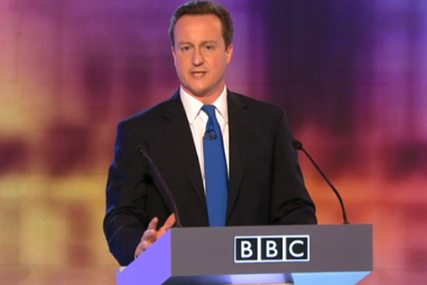
Unofficial overnight TV figures suggest more than 8 million people tuned in to watch the debate, made up of around 7.26m on BBC, 615,000 via BBC News, and around 285,000 via Sky News.
An ITV/ComRes poll of 2,372 viewers put the Conservative leader on 35%, up from 30% the week before. Liberal Democrat Clegg remained on 33%, while Gordon Brown dropped four points to 26%.
Minutes after the leaders said their parting words, Facebook launched a snap poll of 10,000 of its users to find out who, after three weeks of debates, had won the third and final debate.
Clegg remained the clear winner on the social networking site, but his lead narrowed as the debates progressed, reflecting trends in other polls that suggest Cameron had a strong final debate.
Meanwhile, a YouGov poll of 1,151 people for The Sun charted a five-percentage point rise for Cameron, at 41%. Clegg’s popularity remained unchanged in the poll at 32%, but Brown slipped four points to 25%.
A Guardian/ICM poll had the Tory leader as the best performer with 35%, ahead of Brown by six points (29%) and Clegg on 27%.
Another poll by Angus Reid reported that Cameron won on 36%, with Clegg on 30% and Brown on 23%. But its analysis also suggested that Clegg "appears to have done a better job connecting with undecided voters".
If elected, the Conservatives plan to make wide-ranging changes to large swathes of the media and advertising businesses, including disbanding Ofcom and the BBC Trust in their current forms, and significantly scaling back government ad spend with near immediate affect.
Yesterday, it was also revealed by 北京赛车pk10 magazine that agencies could be paid by results if the Tories win the General Election, in an attempt to achieve greater value for money from the COI's £232m annual budget.




.jpg)
.jpeg)
